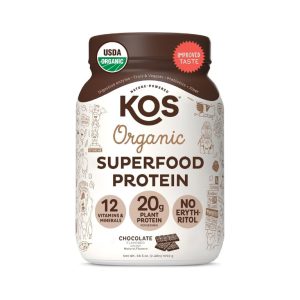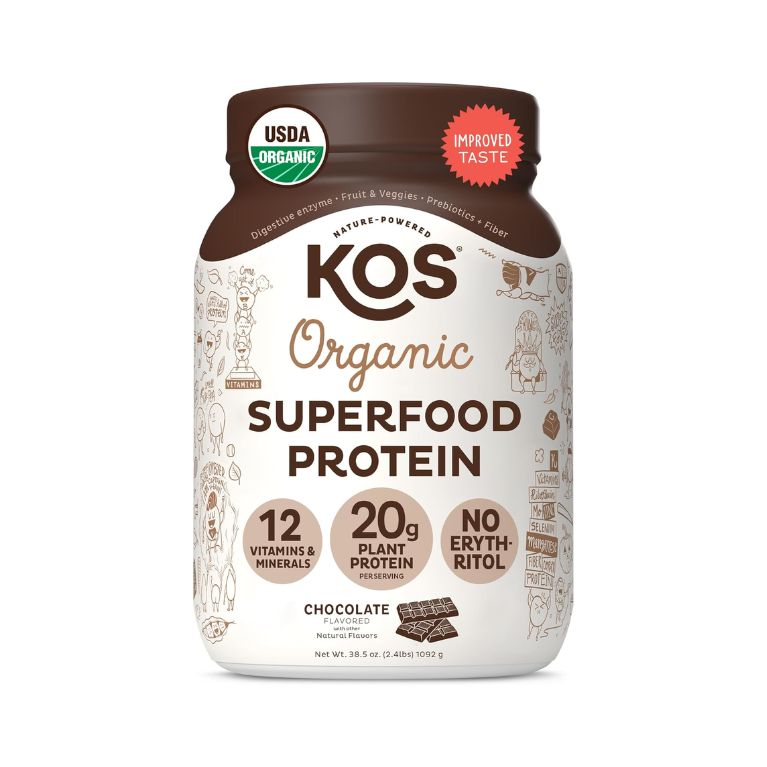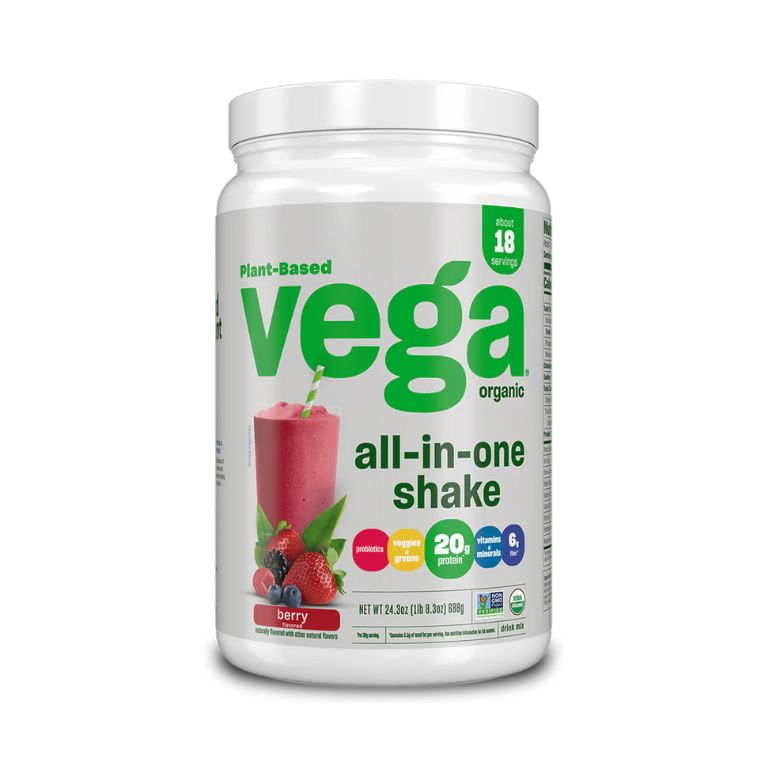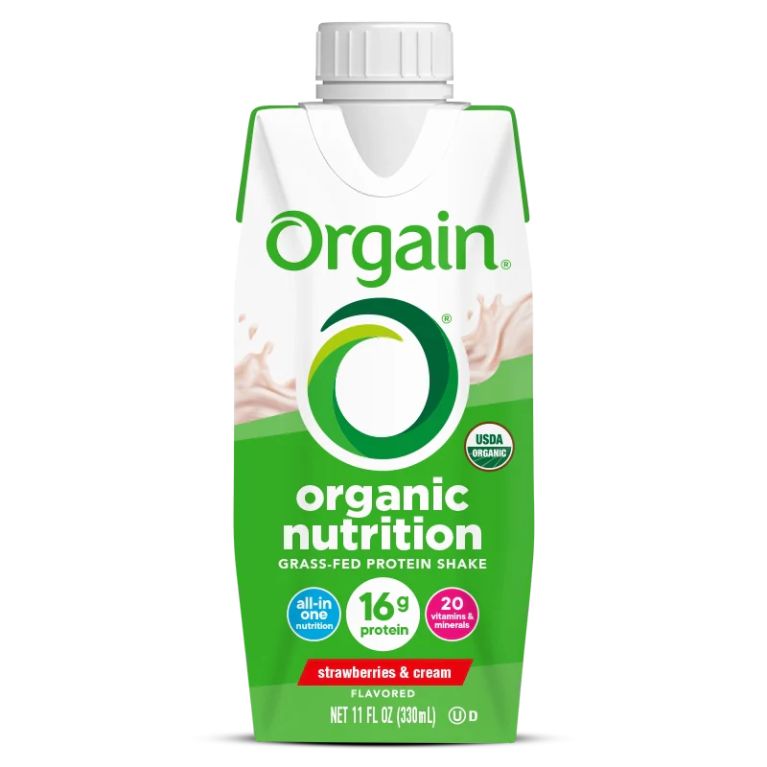As an organic protein powder made from plants, KOS plant protein promises to help you feel full and satisfied without the digestive effects of lactose or whey-based protein powders, all with a flavor and texture that beats other plant-based protein powders. But does it live up to the hype?
Whether you follow a vegan or dairy-free diet or are just looking to incorporate more plant proteins into your routine, you may have considered buying a plant-based protein powder to enjoy as post-workout fuel, to add nutrients to a breakfast smoothie, or to increase the protein of your baked goods.
KOS Superfood Plant Protein is one of the more popular plant-based protein powders on the market, with an investment right in the middle of many competitors. To see if the product matches the value, and help you decide if it could be the best protein powder for you, we researched the ingredients, nutrition, and value. By the end, you should be able to decide for yourself if KOS Plant Protein is an investment you want to make for your diet and health.


Key product features
What you should know
KOS Organic Plant Protein is an organic, vegan protein powder with 20 grams of protein, and a blend of vitamins, minerals, superfoods, and digestive enzymes to support total body health.
- With a blend of five plant proteins, this protein powder is a complete protein source that also provides 3 grams of fiber.
- At $2.14 per serving, this is more expensive than some other plant protein options on the market, although much more budget-friendly than some competitors. Subscribing and looking for sales can bring the price per serving down significantly.
- The plant protein blend and vitamin and mineral profile in this superfood protein powder can help supplement nutrients that many people on a vegan or plant-based diet can fall short on. (1)
KOS Organic Superfood Plant Protein overview
KOS Organic Plant Protein is a vegan, USDA-Certified Organic, and gluten-free protein powder that offers an easy and tasty way for anyone, whether you follow a vegan diet or not, to get more protein, vitamins and minerals, and a boost of “superfoods.”
KOS Plant Protein ingredient breakdown
You’ll find four blends in KOS protein powder: KOS Organic Protein Blend, KOS Organic Superfoods Blend, Vitamins and Minerals Blend, and Digestive Enzyme Blend. Everything is clearly listed on the label, with no proprietary blends, although the individual amounts of the ingredients are not listed or clear.
KOS Organic Protein Blend
With each serving of KOS, you’ll get 20 grams of protein from pea, flax seed, quinoa, pumpkin seed, and chia seed proteins. While animal proteins provide the complete range of amino acids, and plants often miss one or more essential amino acids, this blend of five plant protein sources helps ensure that you are getting complete protein with all nine essential amino acids. (2) However, we would love to see the amino acid profile listed on the bottle or the website for full transparency.
“This way, you can evaluate if you are achieving the optimal amino acids for their recovery properties,” explains Victoria Burgess, PhD, CSCS, CISSN. “For example, the ideal range of leucine, one of the most essential amino acids for MPS, is 2-3g/day. Therefore, understanding if there is a shortage will help you plan out where to get it elsewhere if needed.”
KOS Organic Superfoods Blend
This KOS protein powder has an added blend including coconut milk, inulin, acacia gum, apple, carrot, cranberry, orange, broccoli, shiitake mushroom extract, and tomato, which adds nutrients like fiber, some vitamins and minerals, and a supposed antioxidant boost to the protein powder.
While we can’t know all the benefits this blend may add, it’s likely that the 3 grams of fiber are thanks to the addition of inulin and acacia gum, two forms of soluble fiber. Both of these fibers impact the gut microbiome, improving gut health and potentially improving other health outcomes like metabolic syndrome. (3)
In one study, people with three or more risk factors for metabolic syndrome were given 20 grams of acacia gum fiber daily for 12 weeks. They experienced a significant decrease in blood pressure, fat-free body mass, and fasting glucose. (4) While a serving of KOS per day won’t provide as much soluble fiber as was used in the study, it’s a good addition to other soluble fiber foods you can include in your diet, like whole grains, cabbage, apples, onions, and legumes. (5)
Vitamins and Minerals Blend
The blend of added vitamins and minerals helps make KOS Plant Protein an excellent source (providing more than 20 percent of the daily value (DV) of 11 different vitamins and minerals. For example, here’s the breakdown of the cinnamon cereal crunch flavor:
Iron: 30% DV
Vitamin E: 35% DV
Vitamin B12: 40% DV
Zinc: 20% DV
Copper: 35% DV
Chromium: 35% DV
Riboflavin: 25% DV
Iodine: 20% DV
Selenium: 35% DV
Manganese: 35% DV
Molybdenum: 35% DV
You’ll also get smaller amounts (under 5% of the DV) of niacin, calcium, potassium, and folate.
Several of the vitamins and minerals included in this plant protein powder are helpful for people following a vegan diet, as many vegan diets fall short on vitamin B12, iodine, selenium, and iron, four of which are included in this blend. Vitamin D and calcium are two nutrients not included that people on plant-based diets may also want to pay close attention to. (1)
Digestive Enzyme Blend
While we don’t know exactly how much of each digestive enzyme is added to this protein powder, a mixture of proteases, amylase, cellulase, lactase, and lipase is added to help you better digest and absorb proteins, carbs, and fats.
While most of us do not need extra digestive enzymes (our body produces them on its own), some people, like those with lactose intolerance or other digestive disorders, do not make enough of them to break down the molecules from sugars, proteins, or fats, and can experience digestive distress like gas, bloating, or cramping as a result. (6)
“Proper digestive enzyme proportions within the body will help with stability of the GI system, absorption of vitamins and minerals and also keep bowel movements regular,” Burgess notes.
Other ingredients
KOS Protein powder is sweetened with coconut sugar, stevia, and monk fruit, adding just 0-2 grams of added sugars per serving. You’ll also find various natural flavors in each of the six flavor options, along with sea salt.
Nutrition facts
KOS protein powder is a high protein, low carb option with a small amount of fat added for extra richness and satisfaction. The nutrition profile of this protein powder is excellent for a protein shake or a meal replacement if mixed with a higher-caloric option like soy milk or dairy milk. Along with 20 grams of protein, you get 6-9 grams of carbohydrates and 6-7 grams of fat. It’s a good source of fiber with 3 grams, or 11% of the recommended daily value, per serving.
Many plant-based diets are low in saturated fat, so even though this protein powder has 2.5-4.5 grams or 13-23 percent of the daily value per serving from the addition of coconut milk, it’s not as high of a concern for someone who is eating a primarily plant-based diet that’s low in saturated fat. (7)
“The additional fat will also increase satiety, which can be perfect for a midday snack,” adds Burgess.
Combining a small amount of coconut sugar with monk fruit and stevia helps give this protein powder a sweet flavor without adding too much sugar. You’ll get just two grams of added sugars per serving, which is only 4 percent of the recommended daily limit of 50 grams per day. (8)
Value
If purchased from the manufacturer, you’ll spend $59.99 for a 28-serving container or $2.14 per serving. With a subscribe and save option, the cost is lowered to just $1.71 per serving, making it a better value than many plant-based protein powders on the market.
Flavors and taste
With seven flavor options, you can choose from chocolate, vanilla, cinnamon cereal crunch, strawberries and cream, chocolate peanut butter, salted caramel coffee, and unflavored.
As a plant-based protein powder, KOS isn’t as smooth and creamy as whey protein; if you compare the two, KOS will likely seem quite grainy, especially when mixed with just water. But, compared to many other plant-protein blends, it is less chalky and more creamy than you would expect.
As far as taste is concerned, it really comes down to personal preference. Some customers feel it’s too sweet, while others find it to be the perfect amount of sweetness and that the flavors go well in smoothies and baked goods.
A note on KOS Prop 65 Warning
In April 2023, KOS received a notice that they violated California’s Proposition 65, as Perfluorooctanoic Acid (PFOA) was found in five of their organic protein powders. (9)
Since then, you’ll see the warning on all KOS protein powder labels that “consuming this product can expose you to chemicals including lead, which is known to the State of California to cause birth defects or other reproductive harm.”
The Centers for Disease Control acknowledges that PFAs are harmful chemicals, but the dose that may have a harmful effect on humans is unclear. (10)
These warnings may help you to see how many of the products you may be using daily are exposing you to chemicals that may be dangerous when ingested in large amounts. That said, many products, including everything from makeup to supplements, fabrics, cookware, contact lenses, and food packaging, include these chemicals. Just because KOS includes this warning doesn’t mean it will expose you to dangerous levels of PFAs all by itself.
What customers are saying
KOS Superfood Organic Plant Protein has 4.2 out of 5 stars on Amazon with 25,116 global ratings. Most customers love the flavors and while many are not fans of the texture, others find it to be one of the smoother vegan protein powder options.
“Kinda expensive, but delicious, and gives me the plant protein this vegan person needs. I mix it with a cup of almond milk and a frozen, cut-up banana in a powerful little blender. The texture is smooth and creamy.”
Mary Z., Amazon
However, others just can’t get past the graininess. “OK so I gave this a try and let’s just say the taste plus the texture leaves ALOT to ask for. The consistency of the protein shake was grainy and it tasted like a very downgraded version of chocolate,” says Amazon reviewer Twisty29.
As far as tolerance goes, some customers find that drinking this protein causes an increase in gas and bloating, while others note that it’s easier on their stomach than many other brands. Thejendra R., a verified Amazon reviewer, notes, “I usually couldn’t take protein powder due to picky gut. but this one has been different. very easy on stomach and tastes good. been enjoying it daily.”
Nutrition facts per serving
| Calories | 140-160 |
| Total fat | 6-7 grams |
| Saturated fat | 2.5-4.5 grams |
| Total carbohydrates | 6-9 grams |
| Fiber | 3 grams |
| Added sugars | 0-2 grams |
| Protein | 20 grams |
Compare Kos

|

|

|
|
| KOS Organic Superfood Plant Protein | Vega Organic All-In-One Shake | Orgain Organic Protein | |
| Rating | |||
| Price per serving | $2.14 | $3.80 | $1.90 |
| Grams of protein | 20 | 20 | 21 |
| Protein source | Pea, flax seed, quinoa, pumpkin seed, and chia seed protein | Pea, brown rice, and pumpkin seed protein | Pea, brown rice, and chia seed protein |
| Flavor options | Seven | Six | 14 |
| Certifications | Organic | Organic, vegan, gluten-free | Organic, Certified Plant-Based |
How we test plant-based protein supplements
Plant protein is a popular alternative to whey protein in dietary supplements, whether due to allergies or simple lifestyle preferences. While not all plant protein sources are complete proteins, most plant protein blends include at least one complete protein source.
We evaluate plant protein powders across six categories: protein source, completeness of the protein, macronutrient calories per serving, protein per serving, price per gram of protein, and sweeteners. These categories were developed in collaboration with registered dietitian and sports performance coach, Chris Mohr, Ph.D., RD.
You can read our full plant-based protein testing methodology here.
Protein source–40%
The protein sources in a plant protein powder determine whether it’s a complete protein source. We evaluate eight plant protein sources: soy, pea, hemp, brown rice, lentil, chia, pumpkin seed, and blends.
Complete protein–20%
To be considered complete proteins, protein supplements have to consistently provide all nine essential amino acids, which are necessary for supporting muscle growth and overall development. Complete proteins receive the highest marks.
Macronutrient calories per serving–15%
Most of the calories consumed through plant protein powder should come from protein. However, depending on the protein source and other ingredients, calories can also come from carbohydrates and fats.
Total protein per serving–15%
In general, 25-30 grams of protein per meal, and additional in snacks, meets the daily needs of most people. Most plant protein supplements contain around 15-30 grams of protein per serving.
Price per gram of protein–5%
Price is an important factor for consumers and often reflects the quality of a product. Since protein content is the best measure of value for a plant protein powder, we rate each product based on the price per gram of protein.
Sweeteners–5%
We prefer to see minimal sweeteners in plant protein formulas, and we prefer some over others.
Certifications
Nearly all reputable supplement companies conduct in-house testing for safety and label accuracy. Some brands also opt for additional certifications to further ensure quality and safety. We award bonus credits to brands that undertake this additional step.
Bonus points
We incorporate bonus credits into our plant-based protein supplement scores to recognize innovation and encourage healthy competition among all brands. Plant protein formulas are awarded bonus credits for:
- No proprietary blends
- Sustainable packaging
- Added enzymes
FAQs
Is KOS organic plant protein healthy?
KOS organic protein powder contains several health-promoting nutrients, such as protein, fiber, and vitamins and minerals. As a supplemental protein powder, it can be a healthy addition to a balanced, overall healthy diet.
Is KOS a complete protein?
Combining several types of plant proteins, like in KOS protein powder, creates a complete protein product, even though each individual plant protein may be incomplete on its own.
Does KOS protein powder contain PFAS?
KOS was found to be in violation of California’s Proposition 65 in April 2023, and now each bottle includes a warning label indicating the potential for the presence of chemicals, including lead. (9) This was due to the presence of PFAS, a class of around 15,000 compounds that are linked to detrimental health effects in animal studies. (10)
Is KOS a meal replacement?
KOS is a protein powder, and by itself does not have enough calories to serve as a complete meal replacement. However, you can easily use KOS protein powder in a smoothie or mixed into a higher-calorie liquid to create a meal replacement high in protein and rich in vitamins and minerals.
These statements have not been evaluated by the Food and Drug Administration. These products are not intended to diagnose, treat, cure, or prevent any diseases.
Our experts
Victoria Burgess, Ph.D., CSCS, CISSN
Victoria Burgess earned her Ph.D. in Health and Human Performance from Concordia University Chicago and holds her NSCA CSCS and Certified Sports Nutritionist (CISSN). She is an adjunct professor in the Human Performance and Nutrition department at Concordia University Chicago & Parker University, where she teaches undergraduate, graduate, and doctoral-level courses.
Joana Neziri, M.S., NASM CPT
Joana is a writer, editor, and content strategist focusing on nutrition, fitness, and all things health. After earning a master’s degree in business from the University of North Florida, she began a career in research and digital marketing.
Lily Moe
Lily is a Brooklyn-based writer and editor with over seven years of experience in health media. As a former Fitness Coach, Lily’s editorial prowess has largely focused on fitness, nutrition, and weight management. She has also spent a fair share of time in testing labs, analyzing everything from protein powders to yoga mats. Her work has appeared in Verywell Fit, Verywell Mind, Health, and more.
Kelly Uhler
Kelly has a multifaceted background in elder care, health care, and copywriting. She has worked for organizations such as A Place For Mom and Homecare.com, which gave her the opportunity to work closely with families, providing reliable information to help them make informed decisions about their loved one’s health, safety, and quality of life.

Kelsey Kunik, RDN
Fortune Recommends Nutrition Writer
About Author
Education & Credentials
- Certified Sleep Science Coach
- Emory University, PhD
Sources
- Gibbs J, Cappuccio FP. Common nutritional shortcomings in vegetarians and vegans. Dietetics. 2024;3(2):114-128. doi:10.3390/dietetics3020010
- Hertzler SR, Lieblein-Boff JC, Weiler M, Allgeier C. Plant Proteins: Assessing Their Nutritional Quality and Effects on Health and Physical Function. Nutrients. 2020;12(12):3704. Published 2020 Nov 30. doi:10.3390/nu12123704
- Sheng W, Ji G, Zhang L. Immunomodulatory effects of inulin and its intestinal metabolites. Front Immunol. 2023;14:1224092. Published 2023 Aug 10. doi:10.3389/fimmu.2023.1224092
- Jarrar AH, Stojanovska L, Apostolopoulos V, et al. The Effect of Gum Arabic (Acacia Senegal) on Cardiovascular Risk Factors and Gastrointestinal Symptoms in Adults at Risk of Metabolic Syndrome: A Randomized Clinical Trial. Nutrients. 2021;13(1):194. Published 2021 Jan 9. doi:10.3390/nu13010194
- Ioniță-Mîndrican CB, Ziani K, Mititelu M, et al. Therapeutic Benefits and Dietary Restrictions of Fiber Intake: A State of the Art Review. Nutrients. 2022;14(13):2641. Published 2022 Jun 26. doi:10.3390/nu14132641
- Ianiro G, Pecere S, Giorgio V, Gasbarrini A, Cammarota G. Digestive Enzyme Supplementation in Gastrointestinal Diseases. Curr Drug Metab. 2016;17(2):187-193. doi:10.2174/138920021702160114150137
- Key TJ, Papier K, Tong TYN. Plant-based diets and long-term health: findings from the EPIC-Oxford study. Proc Nutr Soc. 2022;81(2):190-198. doi:10.1017/S0029665121003748
- Added Sugars on the Nutrition Facts Label. U.S. Food And Drug Administration. Published March 5, 2024. https://www.fda.gov/food/nutrition-facts-label/added-sugars-nutrition-facts-label
- Environmental Research Center, Heptinstall C. Notice of Violations of California Health & Safety Code §25249.5 Et Seq.; 2023. https://oag.ca.gov/system/files/prop65/notices/2023-01127.pdf
- Potential health effects of PFAS chemicals | ATSDR. https://www.atsdr.cdc.gov/pfas/health-effects/index.html
